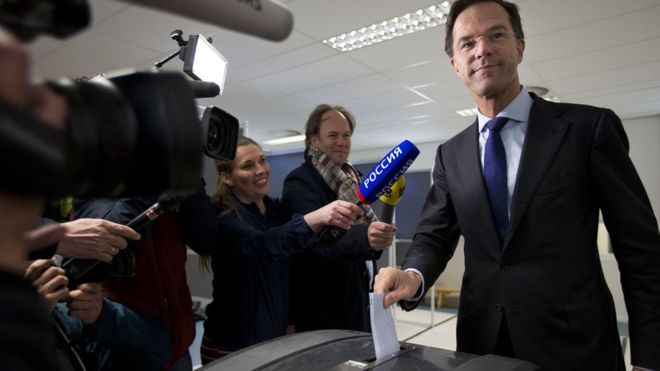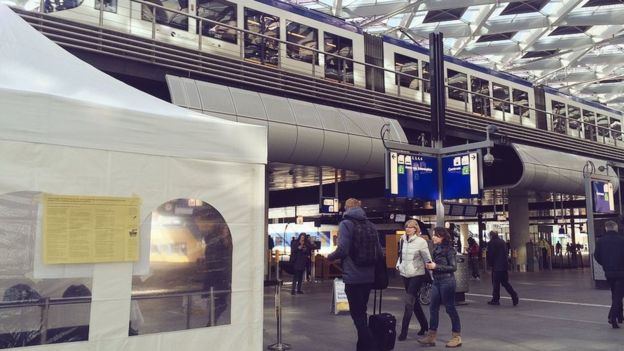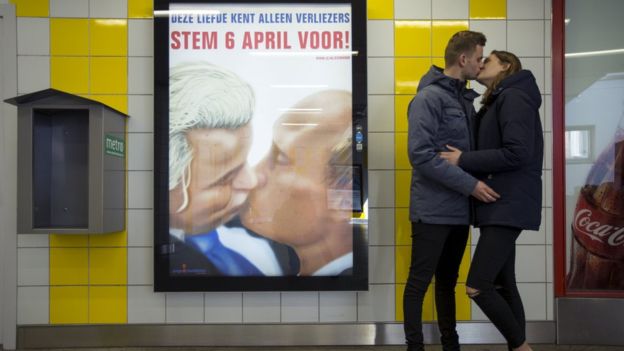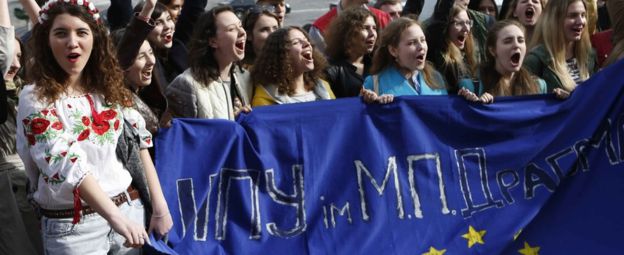Netherlands ‘rejects’ EU-Ukraine partnership deal

Voters in the Netherlands have rejected in a referendum an EU partnership deal removing trade barriers with Ukraine, preliminary results suggest.
With 99.8% of the votes counted, 61.1% had said "No", with 38% supporting a deal, media reports said.
Turnout is projected at 32%, above the 30% threshold of voters needed to be valid but within a 3% margin of error.
Prime Minister Mark Rutte said his government may have to reconsider the treaty if the vote is valid.
The Dutch parliament has already ratified the EU agreement and the result of the vote is not binding.
"We will have to wait and see but it is clear that the 'No' voters won convincingly. The question is whether or not the required turnout will be met." Mr Rutte said in a televised reaction.
"My view is that if the turnout is more than 30%, with such a victory for the 'No' camp, ratification cannot go ahead without discussion."
The referendum was triggered by an internet petition begun by Eurosceptic activists that attracted some 450,000 signatures.
The vote was also seen as a test of public opinion towards the EU, and observers said many voters were likely to use the referendum as a chance to protest against the EU's expansion and what they consider to be its undemocratic decision-making processes.
Voters were asked to either back the deal, reject it or fill in a blank box. During the day, turnout seemed to be lower than in national or local elections.
'A chance to protest' — Dutch Eurosceptics trigger vote
Under the 2015 Dutch law that created advisory referendums, the result will be considered valid only if turnout is higher than 30%.
Officially The Netherlands has rejected a landmark deal between the EU and Ukraine — in reality the issues that dominated this campaign were much wider.
The referendum was triggered by the Eurosceptic movement which used a new Dutch law designed to promote democracy to force a vote by gathering enough signatures on a petition.
From the start activists said this was a chance for Dutch voters to express frustration at the EU, in particular what they see as its desire to expand despite democratic shortcomings.
But they were not asked to simply pass judgement on the EU, and throughout the campaign those promoting a Yes vote were frustrated by what they saw as attempts by Eurosceptics to hijack a debate which should have been about relations between Ukraine, Russia and Europe.
Some say the multiple layers to this referendum means the result cannot seen as a true reflection of the scale of Dutch Euroscepticism.
Nonetheless, the rejection of this deal will rattle the nerves of European leaders who are already struggling to maintain unity in the face of economic instability and the migrant crisis.
Wider issues behind referendum
The exit polls initially put turnout at 29%, before updating it to 32% with a margin of error of 3%.
The vote comes less than three months before British citizens decide in their own referendum whether to leave the EU altogether.
Nigel Farage, who leads the anti-EU UKIP party, said a "No" vote would embolden those campaigning in the UK to leave the 28-member bloc. However, he acknowledged that a "Yes" vote would be a blow to the Brexit campaign.
President Putin's government was vehemently opposed to the EU deal with Ukraine and was widely thought to have pressed then-President Viktor Yanukovych to reject it in November 2013. Mr Yanukovych's decision prompted protests in Kiev that ultimately led to his downfall.
Pro-Russian separatists in eastern Ukraine have widely been blamed for the killing of 298 people, when a Malaysia Airlines flight from Amsterdam was shot down in July 2014. The Netherlands lost 193 of its citizens.
One of the Dutch Eurosceptics behind the referendum, Thierry Baudet, has warned the government to heed a "No" vote on the deal. "It is not good for the Netherlands, not good for Europe and not good for Ukraine," he said on TV on the eve of the vote.
A "No" vote would put the Dutch government under pressure to cancel its ratification.
EU Commission President Jean-Claude Juncker has described the stakes in the run-up to the vote as being high, warning that a "No'" vote could trigger a wider crisis in the 28-member bloc.
The Dutch vote is being covered prominently in Ukraine. "How will our politicians react if the outcome is a resounding no?" One Plus One TV asked as the polls opened.
In the run-up to the vote, Ukraine's media were abuzz with stories about various Ukrainian initiatives to promote the "Yes" campaign, including what they called an "invasion by propaganda troops" — local politicians and activists travelling to the Netherlands.
Many commentators in Ukraine are now wondering whether Kiev has done enough to counter the No campaign, whose efforts included the distribution of free waffles in wrappers with slogans urging the Dutch to vote against the agreement.
Политика конфиденциальности | Правила пользования сайтом











